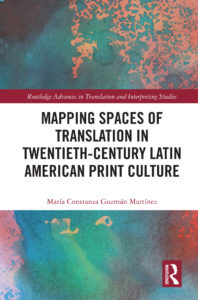Writer: Carli Gardner
Glendon champions its commitment to plurilingualism through programs that promote learning in English, French, Spanish and Indigenous languages. In partnership with the Centre for Research on Language and Culture Contact (CRLCC), faculty research in areas from translation to linguistics complements the College’s plurilingual programs.
Dr. María Constanza Guzmán, Glendon faculty researcher, embodies the CRLCC’s goals “to foster innovative and collaborative interdisciplinary research on language and language related-areas.”
Guzmán is an associate professor and translator whose book Mapping Spaces of Translation in Twentieth-Century Latin American Print Culture was published by Routledge this past summer. Mapping Spaces is an exhaustive study of the connections between translation and print culture in 1960s and 70s Latin America. Mapping Spaces is nominated for the Canadian Association of Latin American and Caribbean Studies (CALACS) 2020 Book Prize.
Dr. Colin Coates, Associate Principal of Research and Graduate Studies, describes Guzmán’s publication as an “ambitious and complex undertaking.”
Mapping Spaces presents research spanning different textual medias (periodicals and magazines), different spaces of literary production (publishing houses), and different fields (translation, literary and intellectual history, and Latin American studies). This extensive study aims to identify gaps in the knowledge of historical translation practices and print culture in 1960s and 1970s Latin America.

Book cover of “Mapping Mapping Spaces of Translation in Twentieth-Century Latin American Print Culture”
Beginning her research project in 2012, Professor Guzmán has traced the translation practices of cultural magazines, influential publishing houses, and periodicals in Latin America and the Caribbean. Guzmán’s research moves beyond typical text-focused studies on individual works to make connections between Latin American print cultures across different genres and nations.
To achieve this breath and depth of research on translation and print culture, Guzmán uses a framework of intersecting theories in the fields of translation, literary and intellectual history, and Latin American studies. In approaching her research from several complementary disciplines, Guzmán considers how various geopolitical dynamics influence translation practices in Latin American print culture.
Guzmán’s consideration of the effects of history, geography, and politics on literary production in Latin America highlights a tension in the region’s translation practices: translation serves both as a tool to perpetuate colonial and Eurocentric intellectual practices, and as a means to challenge the colonial matrix of power.
In identifying translation as a tool for enforcing both colonial and decolonial practices, Guzmán contributes to an expansion of historical knowledge about textual production in the Americas. According to Guzmán, learning about decolonial and emancipatory intellectual practices in Latin America “teach[es] us [about] more equitable and plural forms of knowledge production.”
Guzmán’s research impact extends beyond her field of study to the community and students she serves. A firm believer in “academic praxis [as] social action,” the professor understands that her own teachings and scholarly practices “can create more plural academic spaces which are, in turn, more organically connected to lived linguistic and cultural experience in our world.”

Poster for Glendon Research Festival
It is with great enthusiasm that the Office of Research and Innovation congratulates Dr. María Constanza Guzmán for the recent publication of her book Mapping Spaces of Translation in Twentieth-Century Latin American Print Culture. The Office looks forward to celebrating professor Guzmán’s book publication and more such meaningful research endeavours at the annual Glendon Research Festival. Click here for more information about the Research Festival and Dr. Guzmán’s upcoming talk.
Please note that the finalized event schedule for the Research Festival is still to be determined.


